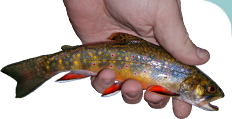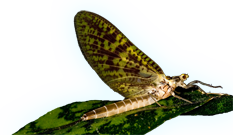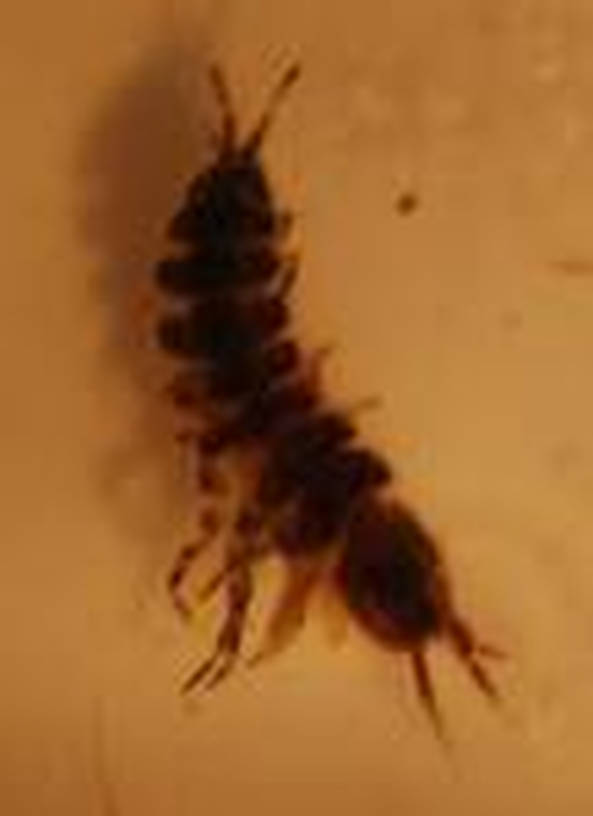Blog & Latest Updates
Fly Fishing Articles
Insects by Common Name


> > is this a scud ?
| FredH | January 26th, 2011, 11:01 am | |
| Lake Charles , Louisiana Posts: 108 | Could someone identify this for me . It comes from the upper NY area . Thanks , Fred | |
| http://www.realisticflytying.net | ||
| Martinlf | January 26th, 2011, 11:04 am | |
Moderator Palmyra PAPosts: 3233 | It looks more like a sowbug to me. | |
| "He spread them a yard and a half. 'And every one that got away is this big.'" --Fred Chappell | ||
| Jmd123 | January 26th, 2011, 12:54 pm | |
| Oscoda, MI Posts: 2611 | It is indeed an isopod, a.k.a. cress bug to many of us fly fisherman types and also called sow bugs. Close, though - also a crustacean, like scuds (a.k.a. amphipods). I'm seeing a whole lot of the latter these days in my benthics samples... The isopods are found both on dry land (though almost always in moist places since they still have to breathe with gills, being crustaceans) and in the water. They are called "chanchitos" (little pigs) in Chile! Jonathon | |
| No matter how big the one you just caught is, there's always a bigger one out there somewhere... | ||
| Jmd123 | January 26th, 2011, 2:11 pm | |
| Oscoda, MI Posts: 2611 | Just found an isopod, too...trying to run it down to family... Jonathon | |
| No matter how big the one you just caught is, there's always a bigger one out there somewhere... | ||
| Trout11B | January 26th, 2011, 5:40 pm | |
| NW Wisconsin Posts: 20 | I realize that's it a little late to chime in and actually identify because everyone's right it is a sow bug. Like scuds most amphipods are found in many streams where there is even a hint of pollution. Pollution not necessarily being that green murky ooze leaking out of a radioactive barrel buried beneath the surface. Leaf litter in the stream, decaying materials, old logs, branches, anywhere there is decomposition you will find these and sowbugs. There's a small creek up here in NW Wisconsin we sampled last spring where 95% of the specimens were sow bugs and scuds. The quality of this stream is terrible. Small, polluted city stream where I was surprised to find even carp in (these I believe were flushed through the sewer system in the recent rains we had then,) so we weren't expecting much but the cleaner streams we sampled held few to no scuds and sows. Interesting little guys. Ryan | |
| Balancing school, military, relationships, sports and all the other things in my life with fly fishing. | ||
| Jmd123 | January 27th, 2011, 10:30 am | |
| Oscoda, MI Posts: 2611 | Ryan, I meant to welcome you to the forum earlier but I have been somewhat in transition with a move from southern Michigan up to proper trout country (Oscoda, near the mouth of the Au Sable River). So, welcome! And I recognize that Eleven Bravo designation anywhere, since many (MANY) years ago I was an Infantryman myself in the 70th Division (Infantry Training) in Livonia, MI when I was in the Reserves. FOLLOW ME!!! I have encountered scuds (amphipods) and sow- or cressbugs (isopods) in both clean and dirty waters, to be honest. I am currently examining some samples from a highly urbanized stream (read: DITCH) and I am finding high densities of scuds, but I have also found them in high numbers in a beautiful little spring-fed trout stream in northern lower MI which has been unimpacted for over a century and hosts thriving populations of brookies and browns. This stream has lots of watercress growing in it and the scuds are somewhat associated with that. I figure I should tie up some scud imitations and drop them just below these watercress beds and wait for the brookies to nail them! I have also found lots of amphipods and isopods in small, clean coastal streams in southwest Oregon (had a job out there in '92-'93) and in springs in southwest Missouri (almost did a doctorate in aquatic entomology there before I realized I didn't want to be stuck behind a microscope for the rest of my life!). In Missouri, one spring that I examined had experienced a hydrocarbon spill (toluene, xylene, benzene, and octane boosters were found - components of gasoline but not in the same proportions). Prior to this spill, the stream had been inhabited by large beds of water mosses with high densities of amphipods according to the property owner. My first visit was not long after the spill, and I could still smell the nasty volatiles coming out of the water. The water moss had turned brown and I found almost no apmphipods present when I pulled up clumps of the moss. During my subsequent visit to actually collect critters the stream was now infested with extremely long strings of green filamentous algae, in which were hundreds to over a thousand isopods per square foot! So, this particular toxic spill (don't let ANYONE tell you that petroleum and its components aren't pure poison) converted this spring stream from a water moss/amphipod ecosystem to a filamentous algae/isopod ecosystem. All I can say is WTF??? During my (not completed) PhD research, I came up with a little formula that I presented at a scientific conference: A+I/C, which stands for amphipods + isopods over Chironomids (midge larvae). I actually found a significant statistical inverse correlation between this formula and increased levels of nutrients, as in when nutrient levels (nitrogen and/or phosphorus, can't remember exactly which as this was almost 14 years ago) went up, the number of scuds and sowbugs went down compared to the number of midge larvae. (Some times I kick myself for not finishing that PhD, as it was really interesting and cutting-edge stuff, but my advisor was a complete a-hole and I ended up getting a divorce and...At least now I am working on very similar stuff and getting paid WAY better for it!) I'm not really sure what scuds and sowbugs tell us about the aquatic environment, but I bet it is worth studying. Perhaps my project work this year can help yield some information... Jonathon the "Bugologist" (once again, at last...) | |
| No matter how big the one you just caught is, there's always a bigger one out there somewhere... | ||
| Trout11B | January 27th, 2011, 4:11 pm | |
| NW Wisconsin Posts: 20 | Hello Jonathan. It's nice to see someone understood the designation and is also a former 11B. Obviously I wasn't trying to suggest that you only find Isopoda and amphipoda in nasty dirty streams, but based on my limited (severely limited compared to yours) research and findings the majority of specimens collected were in areas where there was a slightly greater amount of vegetation and decaying matter. We did find plenty of scuds in a clay/sand substrate in a local bog/pine forest. Obviously in small water pools I mean. They are one of the few inverts that we found consistently in all the areas we researched. | |
| Balancing school, military, relationships, sports and all the other things in my life with fly fishing. | ||
| Jmd123 | January 28th, 2011, 6:17 am | |
| Oscoda, MI Posts: 2611 | Ryan, one thing I read in one of my identification textbooks, Freshwater Invertebrates of the United States (Robert W. Pennak - a good reference to things other than insects), is that amphipods require fairly high levels of dissolved oxygen. I haven't studied this group very much other than finding them in my sampling, so I can't really judge their ecological requirements. Apparently, though, trout (and other fish) will eat them when they are available! Like I said, if my studies reveal anything interesting about them, I'll be sure to share that info here. What is your military status? Are you in ROTC? I did that at the University of Michigan back in my undergrad days - we're talking early 80s here. I was also in the Reserve like I said, so I was pretty immersed in military life. I was also a Political Science major at the time. Then, my life took a sharp turn, I decided to leave the Army (and got an Honorable Discharge in the process) and declared Botany my second major, begining my life as a professional biologist instead... More later when I don't have work waiting for me! Jonathon | |
| No matter how big the one you just caught is, there's always a bigger one out there somewhere... | ||
| Trout11B | January 28th, 2011, 9:31 am | |
| NW Wisconsin Posts: 20 | Currently serving in the guard here in Wisconsin. I'm goin to a small private school at the moment working toward a natural resource major, but there isn't any ROTC program here. Even if it was I don't think I'd go that route. Not really looking at the officer path right not. Would rather a of warrant. Ryan | |
| Balancing school, military, relationships, sports and all the other things in my life with fly fishing. | ||
| Jmd123 | January 28th, 2011, 10:11 am | |
| Oscoda, MI Posts: 2611 | Then they can call you Mister! Jonathon | |
| No matter how big the one you just caught is, there's always a bigger one out there somewhere... | ||
| Trout11B | January 28th, 2011, 11:24 am | |
| NW Wisconsin Posts: 20 | Or Chief! Haha | |
| Balancing school, military, relationships, sports and all the other things in my life with fly fishing. | ||
| Jmd123 | January 31st, 2011, 8:59 am | |
| Oscoda, MI Posts: 2611 | That's right, Chief sounds much better than Mister anyway... Jonathon | |
| No matter how big the one you just caught is, there's always a bigger one out there somewhere... | ||
Quick Reply
You have to be logged in to post on the forum. It's this easy:
Related Discussions
| Title | Replies | Last Reply |
| Pakistani amphipods In the Arthropod Order Amphipoda by Halabano | 0 | |
| Re: Life cycles and hatches In the True Fly Family Chironomidae by Leahdanger | 3 | Mar 9, 2014 by Entoman |
| Re: new member saying "hello" In General Discussion by AFISHN | 6 | Feb 1, 2017 by Powderfinge |
| Paraleptophlebia sp. (2 more) In the Photography Board by Millcreek | 0 | |
| Re: How many flies? In Fly Tying by FisherOfMen | 4 | Jan 7, 2012 by FisherOfMen |
| Re: World's shortest trip to the Catskills In Fishing Reports by Troutnut | 1 | Oct 9, 2006 by Saltyfly |
| Re: Canadian In General Discussion by Canuck | 3 | May 8, 2010 by Canuck |
| Re: Probably E. fragilis, but... In Female Epeorus frisoni Mayfly Dun by GONZO | 1 | Apr 8, 2009 by Troutnut |
| Re: Trout - 9, Jamie - 0 In General Discussion by Jjlyon01 | 5 | Sep 30, 2008 by Wbranch |
| Re: Small-stream brook trout in Alaska? Not exactly... In Site Updates by Troutnut | 5 | Jul 15, 2012 by Jmd123 |
Troutnut.com is copyright © 2004-2024 Jason
Neuswanger (email Jason). See my FAQ for information about use of my images.
 privacy policy
privacy policy




